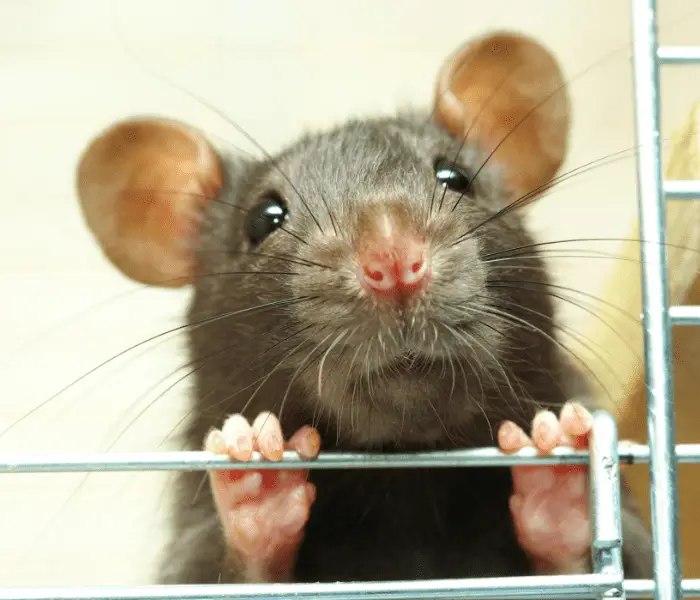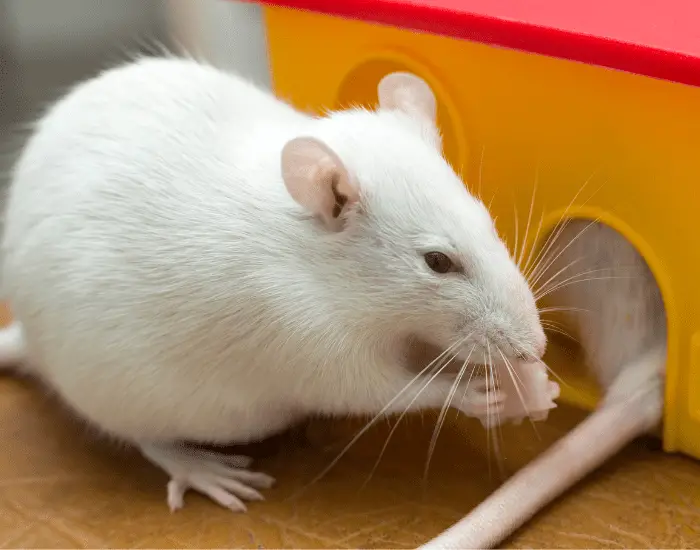
If you have caught your rat munching on poop, don’t fret! This is normal behavior for rats and many other species. This article explains why they do it, the risks and benefits of coprophagia, and when eating poop is a cause for concern.
It is normal for rats to eat their feces (coprophagia) occasionally. By eating their feces, rats can extract more nutrients such as carbohydrates, protein, Vitamin B1, and Folic Acid from their food. Coprophagia also helps to re-populate a rat’s gut with normal good bacteria. It is normal for rats to eat 5-10% of their feces.
Why Do Rats Eat Their Poop?
Rats are inherently coprophagic, and studies show that preventing them from eating their feces severely impacts young rats’ growth. This is because they require an additional chewing and digestion sequence to utilize the nutrients in their food and can only then absorb compounds used for energy and physiological functioning.
Without the re-ingestion (of feces), various mineral and vitamin deficiencies may occur, including those of calcium, magnesium, phosphorous, and Vitamin K.
Rats are omnivores, meaning they consume both meat and plant materials. Although they prefer meat, being omnivorous means they also have to digest cellulose found in plants. Most herbivores are ruminants; thus, they regurgitate and rechew their food and have a gastrointestinal system with four stomachs, in which their gut microbes can ferment such complex carbohydrates.
However, rats only have a singular, simple stomach and gastrointestinal system and do not have a fermentation chamber before their true stomach as ruminants do. Therefore, rats need to utilize an alternative method to extract these valuable nutrients from their food: coprophagia and caecal fermentation.
The gut bacteria of rats ferment carbohydrates and proteins in the caecum (a large outpouching at the entrance to the colon from the small intestine). They are thus called hindgut or caecal fermenters.
| Ruminants | Rodents | |
| Examples | Cows, goats, sheep, antelope | Rats |
| Type of gastrointestinal system | Complex – compartmentalised/ four stomach | Simple – one stomach |
| Where does fermentation take place? | In the rumen (a large chamber, first of the four stomachs) | In the caecum (an outpouching of the colon at its junction with the small intestine) |
| Does fermentation take place before or after the food passes through the true stomach? | Before | After |
| Method of rechewing | Regurgitation from the rumen into the mouth (does not practice coprophagia) | Excretion of hydrous feces that are rechewed, re-ingested, and further digested (coprophagia) |
Rats also require their food to be rechewed and further broken down for it to be fully utilized, but unlike ruminants, they cannot regurgitate their food for it to be rechewed and re-swallowed. They practice coprophagia by excreting and re-ingesting the food:
- To further break down the food particles, increasing the surface area of the particles so that the gut microbes can more efficiently digest the molecules (especially carbohydrates and proteins),
- To allow the caecal bacteria to synthesize essential nutrients (for example, folic acid and Vitamin B12),
- For the stomach to absorb the molecules made available after the initial fermentation in the caecum, as the caecum and colon have low absorptive properties, and
- To restore the gut biome by re-ingesting any bacteria that were excreted with the feces.
Rats produce two types of feces:
- hydrous feces,
- and dry feces.
The hydrous feces can be covered by a thin membrane and are re-ingested by the rats during coprophagia. They contain higher levels of minerals and amino acids and thus must be redigested for the rat to absorb these nutrients. The membrane also slows the passage of food through the gastrointestinal tract, allowing more time for both the stomach enzymes and caecal microbes to digest and utilize the nutrients.
Dry feces are produced after the hydrous feces have been excreted, re-ingested, utilized and excreted. These comprise the majority of droppings you will find on your rat’s cage floor. They also smell different and less pungent than the hydrous feces.
Pet Vet Tip: Want to know why some of your rat’s poop is white? Check out our article here.

Will Dietary Deficiencies Cause My Rat To Eat Their Poop?
It is important to consult your veterinarian to ensure you are feeding your rat a balanced and nutritious diet. Healthy rats who eat a balanced diet will still practice coprophagia as it is an inherent and necessary behavior. The individual rat will differ in how much feces they eat – a standard range varies between 5-10% of feces re-ingested. However, you must observe the percentage of feces your rat eats, as an increase could indicate a deficiency in their diet or a change in metabolic functioning.
It is normal for a rat to re-ingest 5-10% of its feces.
Reasons for an increased level of coprophagia include:
- Thiamine (Vitamin B1) deficiency,
- Pantothenic acid (Vitamin B5) deficiency,
- Iron deficiency, and
- Pregnancy.
There are also differences in levels of coprophagia between the sexes: females naturally show higher levels of coprophagia than males.
When Is Coprophagia A Cause For Concern?
When housed together, rats are likely to consume one another’s feces and their own. This is called allocoprophagia (eating another rat’s feces). While this is not a problem if your rats are healthy and kept isolated from other species, if one of your rat’s contracts a fecal-borne disease – for example, an intestinal worm or protozoal infection – from an external source, this behavior can facilitate the spread of the disease and is a threat to the health of your rats.
Can Eating Poop Make My Rat Sick?
Suppose one rat is infected with internal parasites (worms) and another practices allocoprophagia. In that case, this causes a transfer of worm eggs from the infected feces into the intestinal tract of the other rat by ingestion. This allows the worm to continue its lifecycle by infecting a new rat.
Rats can be infected with worms through contact with the soiled bedding or feces of another species (for example, your cat). To prevent this, keep your rats and other pets separated and disinfect your rats’ cage and other pets’ bedding at regular intervals.
Clinical signs of a helminth or protozoal infection include diarrhea, weight loss, lethargy, and a rough coat. If you notice these signs or a change in feeding behavior in your rat, please consult your local veterinarian.
Pet Vet Tips: Want to know whether you need to take your rat to the vet? This article lists all the concerning symptoms to watch out for. And for more tips on how to help your rat gain weight, have a look at this article.
Conclusion
It is essential to allow your rat to practice their normal level of coprophagic behavior, as rats that are prevented from coprophagia do not grow properly and develop vitamin and mineral deficiencies. Keep your rat healthy by leaving some of its poop in the cage!
References
- Armstrong, B. and Softly, A. (1966). Prevention of coprophagy in the rat. A new method. Br. J . Nutr, 20(3).
- Barnes, R. and Fiala, G. (1958). Effects of the Prevention of Coprophagy in the Rat: II. Vitamin B12 Requirement. The Journal of Nutrition, [online] 65(1), pp.103–114.
- Barnes, R.H. and Fiala, G. (1959). Effects of the Prevention of Coprophagy in the Rat. The Journal of Nutrition, 68(4), pp.603–614.
- Cree, T., Wadley, D.M. and Marlett, J. (1986). Effect of Preventing Coprophagy in the Rat on Neutral Detergent Fiber Digestibility and Apparent Calcium Absorption. The Journal of Nutrition, 116(7), pp.1204–1208.
- Donnelly, T.M. (2007). Rodent Husbandry and Care. [online] Veterinary Partner (VIN).
- Harshman, S.G., Fu, X., Karl, J.P., Barger, K., Lamon-Fava, S., Kuliopulos, A., Greenberg, A.S., Smith, D., Shen, X. and Booth, S.L. (2016). Tissue Concentrations of Vitamin K and Expression of Key Enzymes of Vitamin K Metabolism Are Influenced by Sex and Diet but Not Housing in C57Bl6 Mice. The Journal of Nutrition.
- Hiroki Shichijo, Takahashi, T., Kondo, Y., Sakamoto, S.H. and Morita, T. (2013). Nutritional significance of coprophagy in the rat-like hamster Tscherskia triton. mammalia, 77(3), pp.329–333.
- Morley, N.J. (2022). Chapter Two – Vertebrates as uninfected disseminators of helminth eggs and larvae.
- Neale, R.J. (1982). Coprophagy in iron-deficient rats. Laboratory Animals, 16(2), pp.204–207.
- Seizi Sukemori, Ikeda, S., Kurihara, Y. and Ito, S. (2003). Amino acid, mineral and vitamin levels in hydrous faeces obtained from coprophagy-prevented rats.
- Tadayyon, B. and Lutwak, L. (1969). Role of Coprophagy in Utilization of Triglycerides, Calcium, Magnesium and Phosphorus in the Rat. The Journal of Nutrition, 97(2), pp.243–245.
